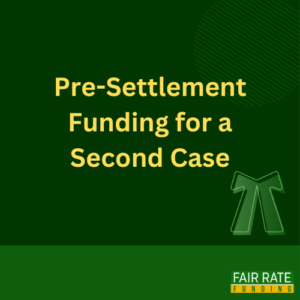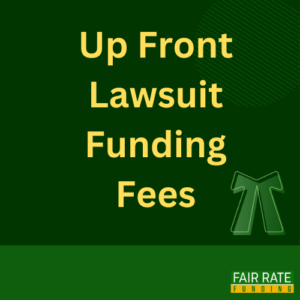Why Lawsuit Loans are a Last Resort for Plaintiffs
For plaintiffs facing financial hardships during lengthy legal battles, lawsuit loans are a lifeline. Lawsuit loans offer immediate cash advances against the potential recovery from a lawsuit. However, while they immediate relief, lawsuit loans come with some drawbacks which sometimes make them a last resort for plaintiffs. In this post, we explore why many plaintiffs consider only lawsuit loans as a last resort after they’ve exhausted all other liquidity solutions.
Understanding Lawsuit Loans

Lawsuit loans are not traditional loans but rather non-recourse cash advances. This means that if plaintiffs lose their cases, they are not obligated to repay the lawsuit lender. This is because legal funding transactions are structured as a transfer of property rights in the future proceeds of a lawsuit. In other words, plaintiffs sell a portion of their recovery ahead of time and repay the advance when they receive compensation.
Lawsuit funding’s unique nature reduces risk for the borrower, but it comes at a price. Funding companies must offset their risk of loss in some fashion. This is accomplished by charging higher interest rates and fees than otherwise would be available with traditional lending. Since every loss is potentially a total loss, the additional risk must be reflected in lawsuit loan pricing.
Lawsuit Loan Cost
As stated above, one primary reason why lawsuit loans are a last resort is their cost. Interest rates on lawsuit loans often range from 35% to 60% annually, far exceeding the rates of most traditional financial products. Since cases can take months or even years to resolve, the amount owed can grow substantially.
For example, if a plaintiff borrows $10,000 at a 40% annual interest rate and their case takes two years to resolve, they could owe the lender more than $19,000—almost double the original amount.
Lawsuit Loans and Traditional Lending
Of course, differences exist between lawsuit funding and personal loans. While lawsuit loans are simply a sale of a future asset, traditional lending implies repayment at some point in the future. Further, personal loans generally require the following:
- Periodic repayments
- Credit checks
- Income or asset verification
- Employment verification
- Personal liability for repayment
These differences pose a significant problem for some plaintiffs during litigation. First, injuries may prevent some plaintiffs from earning a living. Income and employment verification thus becomes a significant hurdle. Also problematic are the periodic payments most traditional loans require.
Another concern is the creditworthiness of the applicant. Lawsuit loans used as a last resort means that other sources of liquidity have not been sufficient. Many plaintiffs suffer from lower credit scores as a result – making traditional lending a wasted effort.
One final difference is the ease in which plaintiffs secure lawsuit loans and the speed in which they are processed. Lawsuit lenders realize their customers are in financial trouble. Some applicants face eviction or worse. Accordingly, lenders offer same day lawsuit loans for qualified applicants.
Limited Regulation
The lawsuit loan industry is not as tightly regulated as traditional lending sectors, which can leave plaintiffs vulnerable to predatory practices. Some lenders fail to provide clear terms or fully disclose the total cost of the loan, leading to unexpected financial burdens.
The good news is that it’s never been easier to get the best deal. The internet is a great source of information and contacting multiple lawsuit lenders is always a good idea. Finding a reputable lawsuit funding company is easy and since most will adhere to lawsuit loan best practices, is well worth the effort.
If You Have Any Questions, Call 888-964-2224
WE ARE HERE TO HELP YOU!
Alternatives to Lawsuit Loans
Most plaintiffs explore alternative options, leaving lawsuit loans as a last resort. These lawsuit loan alternatives include:
- Negotiating Payment Plans: Plaintiffs can often work with existing creditors or service providers to establish manageable payment plans when the need arises.
- Seeking Help from Friends or Family: Borrowing from trusted personal connections can eliminate the high costs associated with lawsuit loans.
- Accessing Traditional Credit: For those who qualify, personal loans or credit cards may offer lower interest rates and better terms.
- Nonprofit Assistance: Some organizations provide financial assistance to individuals involved in legal disputes.
- Selling Personal Property: Sales of personal property are often one-time transactions and perhaps the quickest and most efficient way of raising money.
When a Lawsuit Loans Are Necessary
While lawsuit loans are a last resort, there are situations when they’re the only viable option. Plaintiffs who face eviction, medical emergencies, or other urgent financial needs and have exhausted all other resources may find that a lawsuit loan provides the immediate relief they require.
Making an Informed Decision
If you are considering a lawsuit loan, research and compare multiple lenders. Look for transparent terms, avoid hidden fees, and calculate the total repayment amount based on your case’s estimated timeline. Remember, the best lawsuit loan companies offer clear terms which specify repayment amounts right on the contract.
Consulting with your attorney can also provide valuable insight into whether a lawsuit loan is appropriate for your situation. Making your attorney aware of your intentions is always a good idea. Most are willing to guide you through the process. And since attorney cooperation is vital in the endeavor, their presence during the transaction can only help.
Conclusion and Next Steps
Lawsuit loans provide financial relief during challenging times, but their high costs and potential risks usually make them a last resort for plaintiffs. By understanding these specialty finance solutions, plaintiffs can make the best possible decision regarding their own circumstances. After all, they are in the best position to make that determination.
Why Choose Fair Rate Funding
You obviously have a choice in who you use for legal funding. We offer:
- Simple and Easy Process – Approval only on the strength of your case.
- Risk – Free Proposition – Only repay if you win your case.
- Rapid Approval and Funding – Approvals often within 24 hrs.
- Up Front Pricing – Absolutely no hidden fees.
Give us a call and learn about your options. We are here to help and are at your service.
Thank you for your interest in Fair Rate Funding.








